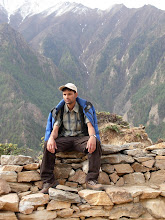The two-day workshop “Linking Geodata with Biodiversity Information in the Himalayas” organised by the International Centre for Integrated Mountain Development (ICIMOD) and the Global Mountain Biodiversity Programme (GMBA) concluded on Sunday 16th November with a call to create a mountain biodiversity information network in the Hindu Kush-Himalayan region for mutual benefit and transboundary cooperation. The workshop was organised as a precursor to the ongoing International Mountain Biodiversity Conference and was attended by representatives from ICIMOD’s regional member countries: Afghanistan, Bangladesh, Bhutan, China, India, Myanmar, Nepal, and Pakistan. The workshop emphasised the increasing need for geo-coded information in the inventory and assessment of biodiversity that are essential for management strategies and conservation interventions as well as for developing and testing scientific hypotheses.
Dr. Andreas Schild, Director General of ICIMOD welcomed the participants and emphasised the importance of geo-coded information in understanding the rapid environmental changes that are taking place in mountain ecosystems. He highlighted the significant role that ICIMOD can play to promote regional approaches and a methodology for filling the data gap in the Himalayas. Professor Christian Körner, chair of the Global Mountain Biodiversity Programme, stressed the biophysical characteristics of the mountains which are endowed with immense biodiversity. Locational information is not only fundamental for understanding biodiversity but also helps us to explore the evolutionary process of species. There is a need to build a corporate community for making mountain biodiversity information available to a wider scientific community and policy-makers.
ICIMOD and GMBA shared their experiences in developing GIS-enabled biodiversity portals as a gateway for biodiversity information and demonstrated the benefit of geo-referenced biodiversity data for integrated analysis and spatial visualisation of biodiversity information in relation to climate, land use, physiography, and other important parameters. The workshop participants deliberated on ways of improving the biodiversity database at the national and local levels, the need for standardisation and harmonisation for data exchange, and providing a way to facilitate easy and open access to geo-coded biodiversity information. The workshop participants emphasised the role of ICIMOD as a regional knowledge hub on biodiversity by linking with global level initiatives and customising relevant international knowledge and experience, and thereby transferring the necessary technology to the member countries. The participants stressed the importance of creating a mountain biodiversity information network in the Hindu Kush-Himalayan region for mutual benefit and transboundary cooperation.
Dr. Andreas Schild, Director General of ICIMOD welcomed the participants and emphasised the importance of geo-coded information in understanding the rapid environmental changes that are taking place in mountain ecosystems. He highlighted the significant role that ICIMOD can play to promote regional approaches and a methodology for filling the data gap in the Himalayas. Professor Christian Körner, chair of the Global Mountain Biodiversity Programme, stressed the biophysical characteristics of the mountains which are endowed with immense biodiversity. Locational information is not only fundamental for understanding biodiversity but also helps us to explore the evolutionary process of species. There is a need to build a corporate community for making mountain biodiversity information available to a wider scientific community and policy-makers.
ICIMOD and GMBA shared their experiences in developing GIS-enabled biodiversity portals as a gateway for biodiversity information and demonstrated the benefit of geo-referenced biodiversity data for integrated analysis and spatial visualisation of biodiversity information in relation to climate, land use, physiography, and other important parameters. The workshop participants deliberated on ways of improving the biodiversity database at the national and local levels, the need for standardisation and harmonisation for data exchange, and providing a way to facilitate easy and open access to geo-coded biodiversity information. The workshop participants emphasised the role of ICIMOD as a regional knowledge hub on biodiversity by linking with global level initiatives and customising relevant international knowledge and experience, and thereby transferring the necessary technology to the member countries. The participants stressed the importance of creating a mountain biodiversity information network in the Hindu Kush-Himalayan region for mutual benefit and transboundary cooperation.



No comments:
Post a Comment